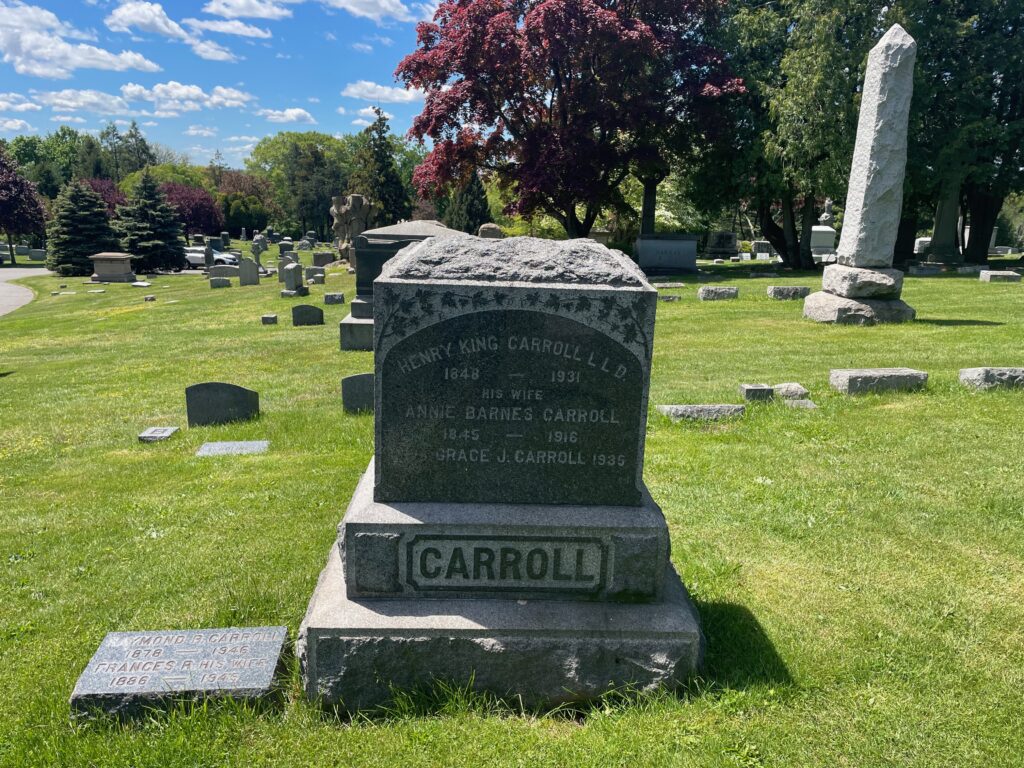Erik Visits an American Grave, Part 1,402
This is the grave of Henry King Carroll.

Born in 1848 in Dennisville, New Jersey, Carroll grew up a strong Methodist. Now, I should say that this is one of the most obscure people I have covered in the series, so I am working with fewer resources than normal, many of which are produced by himself. In any case, he didn’t really get that much schooling as this was a fairly isolated part of New Jersey at this time. Still is today, sort of. He grew up, moved to Philadelphia and then New York, working in low-level journalism jobs. He worked for the Associated Press for awhile on the telegraph machine, following news outside New York. In 1876, he took a higher-end job with The Independent, which was in its earlier days connected to Henry Ward Beecher but was now basically a literary magazine with a spiritual bent. He did well. He was responsible, at least in part, for continuing this journal as a major place for poetry and among the poets he worked with included John Greenleaf Whittier, William Cullen Bryant, and Oliver Wendell Holmes, Sr.
But Carroll had a higher interest–the Methodist Church. In 1890, he left The Independent when the federal government hired him to run part of the census about religion (I am not sure if this was the 1890 Census or a different thing entirely; again, I am working from not much here). It was part of the Census Office though. It was successful and he went into religious writing and history. The Religious Forces of the United States was his first book who came out of this.
Carroll was also interested in Latin America. This is the time to discuss the relationship between Protestant churches and imperialism. The Protestant missionaries were front-line imperialists all the way back to the 1840s. The same families who produced these missionaries going to places like Hawaii and China after the Second Great Awakening were the families also invested in industrial and merchant capitalism who would become the dominant economic force of the Gilded Age. John D. Rockefeller was a staunch Baptist, just as one example. But more importantly, imagine you being a missionary in Hawaii or China in 1849. You are already ideologically committed to market capitalism, which these savages also don’t have, just like they don’t have Christianity or white male American democracy. You write back to your family and tell them about the awesome economic opportunities. This is basically how the Hawaiian sugar and pineapple plantation dynasties were established. Well, things hadn’t really changed that much a half-century later. People who thought Protestantism was morally superior to Catholicism were also likely to go down to Latin America to convert the papists to the truth faith.
So it was perfect for William McKinley to name Carroll as U.S. Commissioner to Puerto Rico after the unjust and imperialist war against Spain.. He had the Methodist background that people like McKinley and the other imperialists wanted to reshape such a backwards place. Basically, Carroll’s job was to observe the region and how it needed to remade in a way that reflected all the ideological preconceptions of elite northern Protestants.
After this, Carroll went all in with the Methodists. He became the church’s leading Latin American organizer of missions. He published Missionary Growth of the Methodist Episcopal Church about it, which I am sure is a very exciting read. He also had an interest in ecumenicalism and in 1913, became Associate Secretary of the Federal Council of the Churches of Christ in America, which was such an organization, based out of Washington, D.C. He headed that for the next four years. In that job, he published, or had published, a bunch of papers and pamphlets about the state of religion in America.
Carroll died in 1931, in North Plainfield, New Jersey, where he had retired. He was 82 years old.
I grant that this post is a bit light, but there’s a whole world of research out there still be done about people like Carroll and the relationship between religion and imperialism.
Henry King Carroll is buried in Hillside Cemetery, Scotch Plains, New Jersey.
If you would like this series to visit other agents of American imperialism in Puerto Rico, you can donate to cover the required expenses here. Charles Herbert Allen is in Lowell, Massachusetts and William Henry Hunt is in Washington, D.C. Previous posts in this series are archived here and here.


